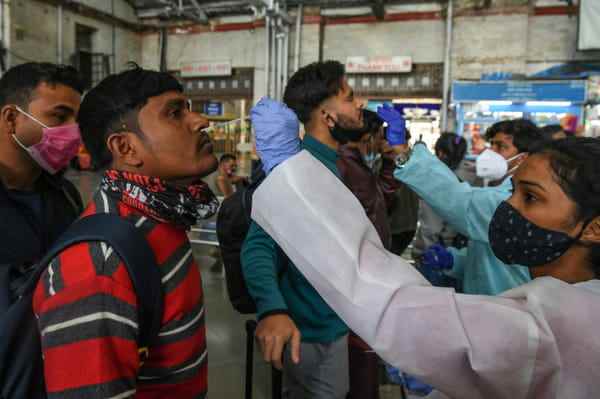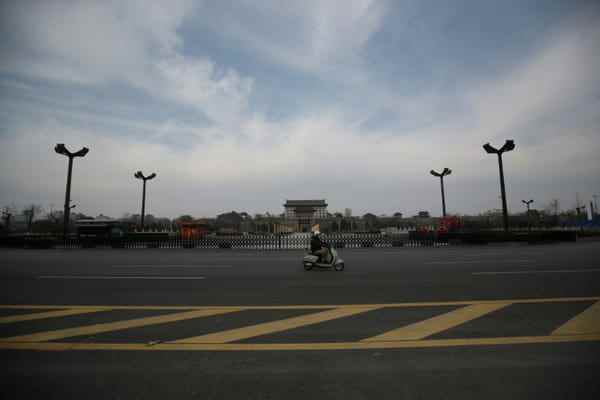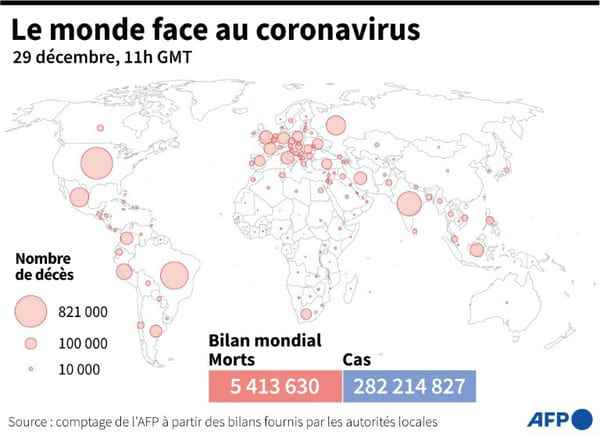The “tsunami” of Covid-19 cases poses serious risks to health systems, the WHO warned on Wednesday, against the backdrop of the outbreak of the pandemic in recent days, with a record number of contaminations in the world on the past week.
The head of the World Health Organization has once again sounded the alarm: “I am very concerned that the more transmissible Omicron circulating at the same time as Delta is causing a tsunami of cases. exerts and will continue to exert immense pressure on an exhausted health workforce and health systems on the brink of collapse. “
This pressure is not only due to new patients, but also to the large number of healthcare workers falling ill, added Tedros Adhanom Ghebreyesus. “Unvaccinated people are much more likely to die from one or the other of these variants,” he also hammered.
More than 935,000 cases of Covid-19 on average were detected every day between December 22 and 28, a number not yet reached since the start of the pandemic at the end of 2019, which represents an increase of 37% compared to the previous week , according to an AFP count made from official reports.
“The overall risk associated with the new variant of concern Omicron remains very high”, with in particular a “doubling rate (of cases) of two to three days”, noted the WHO in its weekly epidemiological bulletin, despite preliminary data suggesting a lower risk of hospitalization linked to Omicron.
Most of the new infections – on the rise globally since mid-October – are found in Europe where several countries have recorded new records of daily cases.
– “Tsunami” –
As in France, with 208,000 cases recorded on Wednesday for the past 24 hours. Figures that “make you dizzy”, noted the Minister of Health Olivier Véran. According to him, it is no longer a “wave” or even a “tidal wave”, but a “tidal wave”.
Some “10% of the French population is in contact” and the unvaccinated have “little chance of passing between the drops, the virus circulates too much”, he warned. The French authorities have taken new measures in recent days, but without resorting to a curfew or new confinement.
Denmark, currently the country in the world with the most new cases of Covid-19 relative to its population, has similarly smashed its record, with 23,228 additional cases in 24 hours.
A peak in contamination was also reached in the United Kingdom on Tuesday: nearly 130,000 cases in England and Wales. This country has started a massive vaccine booster campaign which has already allowed an additional dose to be administered to almost 57% of those over 12 years old.

A team of paramedics bring a patient to a hospital in London on December 28, 2021
© AFP – Hollie Adams
Spain, Portugal and Greece have also seen the contaminations explode.
Identical situation on the other side of the Atlantic.
With more than 265,000 daily cases on average for a week, the United States faces a record of infections. Omicron is now the dominant variant in this country.
US health authorities have warned that antigenic screening tests, with rapid results, were less sensitive to the Omicron variant than to previous variants and therefore potentially less reliable.
Argentina has also experienced a spectacular spread of the virus, with nearly 34,000 new infections in the past 24 hours.

Passengers tested for Covid-19 upon arrival at a station platform in Mumbai, India on December 29, 2021
© AFP – Indranil MUKHERJEE
In Israel, the number of additional cases is also increasing (2,967) without however translating so far into a marked increase in hospitalizations in this country where more than half of adults have already received a booster dose and where scientists have been carrying out since Monday clinical trials on the suitability of a fourth dose of vaccine.
So far, the explosion of the pandemic has not translated into an overall increase in the death toll, which has been declining for three weeks worldwide
– New restrictions –
Several countries have put in place tough new restrictions.
China, which records an epidemic outbreak within 40 days of the Beijing Winter Olympics, confined tens of thousands of additional people on Tuesday.
After the city of Xi’an (north) subjected for a week to quarantine and which is now experiencing supply difficulties, several tens of thousands of inhabitants of a district of the city of Yan’an, 300 kilometers from Xi’an, were instructed on Tuesday to stay at home, with businesses scheduled to close.
China on Tuesday reported 209 new patients in 24 hours, the highest number in 21 months.
In Germany, where a new battery of restrictions came into force on Tuesday, the Minister of Health is preparing the spirits for a new turn of the screw. “Current measures (…) will not be enough to prevent a significant increase in cases of infection linked to Omicron,” said Karl Lauterbach.
South Africa, which announced last week the end of the tracing of contact cases of people tested positive for Covid-19, reversed this decision.
The Covid-19 pandemic has killed at least 5,413,630 people worldwide since the appearance of the coronavirus at the end of 2019, according to a report established by AFP from official sources, Wednesday at 11:00 GMT.
According to the WHO, the number of deaths linked to Covid-19 could be two to three times higher, taking into account the excess mortality directly and indirectly linked to this coronavirus.
All rights of reproduction and representation reserved. © (2021) Agence France-Presse



